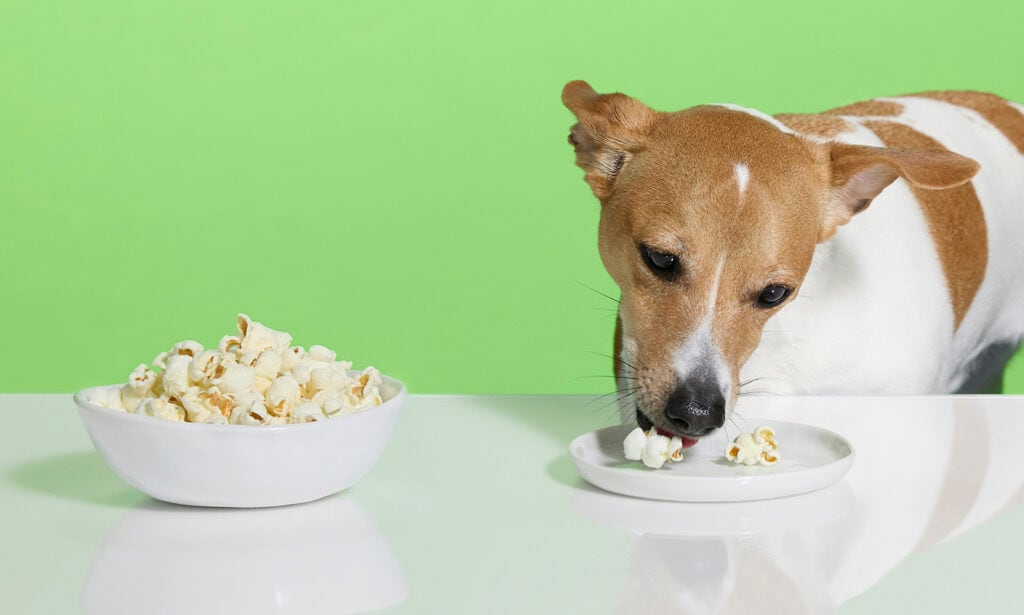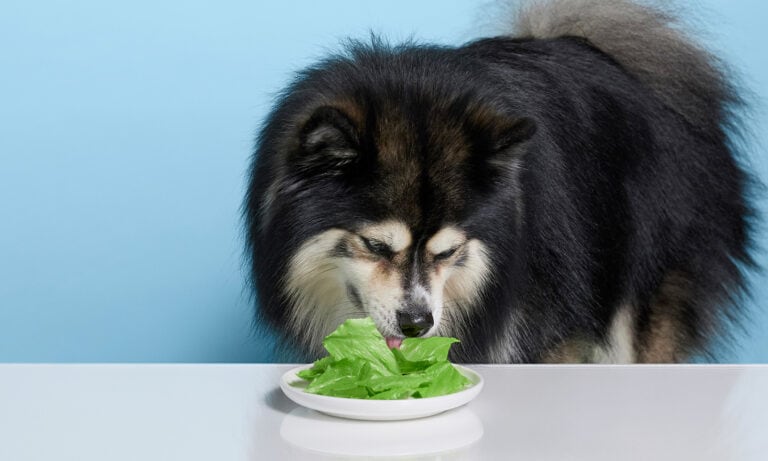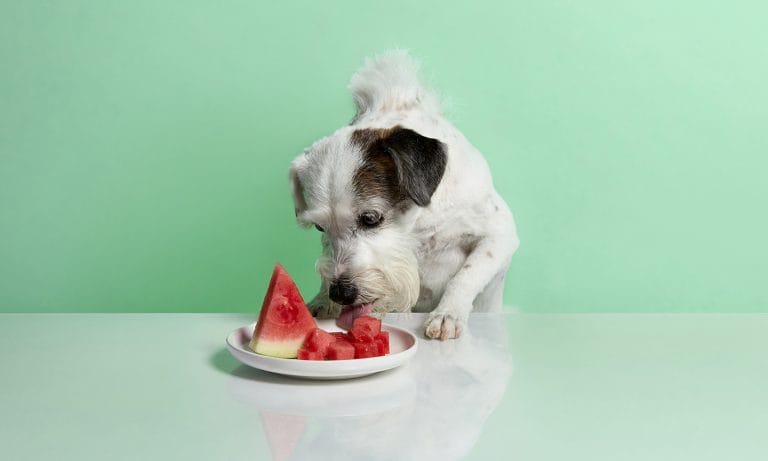Who doesn’t love sitting down to watch a movie with an overflowing bowl of salty, buttery popcorn? But as you dig in to mindlessly snack on the crunchy treat, you might be tempted to share it with your pup. But can dogs eat popcorn too?
When it comes to popcorn and dogs, only plain, air-popped popcorn is safe for dogs to eat in moderation. Popcorn made with oil, butter, salt, cheese, or other toppings, however, is not safe for your dog.
And what about microwave popcorn? Microwave popcorn contains diacetyl, the effects of which on dogs is inconclusive and so should be avoided.
Before introducing any new food into your dog's diet, always check with your veterinarian.
In This Guide:
Can Dogs Eat Popcorn?
Yep, dogs—and puppies—can eat popcorn, but only if the popcorn is air-popped and plain. That means no butter, no salt, and no other toppings that are harmful to dogs.
Can dogs have other kinds of popcorn, like caramel popcorn or kettle corn? Here’s the verdict:
- Can dogs eat caramel popcorn? No, dogs should not eat caramel popcorn because it’s very high in sugar. Even a few pieces of caramel popcorn can cause your dog to feel ill. You should also avoid feeding your dog “sugar-free” caramel popcorn as it likely contains an artificial sweetener called xylitol, which is toxic to dogs.
- Can dogs eat kettle corn? No, dogs should not eat kettle corn because it also contains a lot of sugar and other preservatives that are unhealthy for pups and can cause gassiness, stomach pain, diarrhea, or vomiting.
- Can dogs eat popcorn with butter? No, dogs should not eat popcorn with butter. While a few pieces may not cause harm to a healthy dog, eating butter regularly or in large amounts can cause upset stomach, obesity, or pancreatitis.
- Can dogs eat popcorn kernels? No, you should keep whole or partially popped kernels away from your dog. The kernels can get stuck in your pup’s teeth and cause dental issues. They also can pose a choking hazard.
- Can dogs eat popcorn chips? No, dogs shouldn’t eat popcorn chips. While it’s probably not dangerous if you happen to drop a popcorn chip on the floor and your dog snatches it up, popcorn chips often have added ingredients and flavorings that are not good for your dog to consume, like salt and seasonings such as onion and garlic powder.
Is Popcorn Good for Dogs?
Is Popcorn Bad for Dogs?
While treating your dog to few pieces of plain, air-popped corn fed by hand is safe, popcorn can present a few risks for dogs, including:
Upset Stomach
If your dog eats popcorn and it doesn’t sit well with them, or they’ve eaten too much popcorn, it can lead to upset stomach, and they may experience symptoms such as vomiting, diarrhea, or abdominal pain.
If you see any of these signs of trouble, stop feeding popcorn to your dog and contact your vet.
Sodium Poisoning
If popcorn is flavored with salt and a dog eats too much of it, it can cause salt poisoning.
Signs of salt poisoning in dogs include:
- Decreased appetite
- Vomiting
- Diarrhea
- Sluggishness
Choking Hazard
Eating too much too fast poses a potential choking hazard for dogs, especially small dogs.
Kernels of corn that have not popped can also hurt your dog’s teeth and pose a choking hazard.
Make sure your dog has swallowed each piece before offering another.
If you see your dog choking, take them to your veterinarian immediately. If your dog is choking and can’t breathe, use the Heimlich maneuver and contact your veterinarian.
Pancreatitis
Ingesting too much butter can lead to pancreatitis in dogs.
Pancreatitis and weight gain are also a possibility, says Jennifer Herring, DVM, and director of emergency and critical care services at the Veterinary Specialty Center in Chicago.
“However, these problems are seen more commonly in those pets that have underlying diseases, are fed the buttered or salted versions, ingest large amounts, or have other predisposing factors that could lead to ill effects,” she adds.
How Much Popcorn Can Dogs Have?
Popcorn is considered a treat, and treats should be fed in moderation, making up no more than 10% of the total calories of your dog’s daily diet, with the rest coming from a complete and well-balanced dog food.
About 1 cup of plain, air-popped popcorn contains about 30 calories.
That said, below are general guidelines for safely feeding popcorn to your dog based on weight. However, you should always consult with your vet before serving popcorn to determine the right portion size for your dog.
Extra-small dog (2–20 pounds)
1–2 pieces
Small dog (21–30 pounds)
2–3 pieces
Medium-size dog (31–50 pounds)
5–6 pieces
Large dog (51–90 pounds)
Small handful of pieces
Extra-large dog (91+ pounds)
Handful of pieces
Though a few pieces of popcorn are unlikely to cause any ill effects, you should call your veterinarian if your dog has accidentally eaten a large quantity of popcorn, particularly buttered popcorn.
“Dogs should not be fed large quantities of popcorn or there could be harmful ill effects, mostly related to the gastrointestinal system,” says Dr. Herring. “Accidental ingestion of a few pieces of popcorn is often harmless unless your pet has a history of other diseases.”
How To Safely Feed Popcorn to Your Dog
Here are some tips for safely preparing and feeding popcorn to dogs:
- Serve plain and air popped. Remember, toppings such as butter and salt can be harmful to dogs and lead to upset stomach, among other symptoms.
- Feed by hand. Do not place a bowl of popcorn or leave a bag of popcorn in front of your dog, as eating too much too fast poses a potential choking hazard. Plus, the actual bag can pose a life-threatening suffocation hazard.
- Start small. Serve one or two pieces to start and see how your dog reacts to eating the popcorn.
Store-Bought Popcorn Dog Treats and Toys
FAQs About Dogs and Popcorn
Q:Can popcorn kill dogs?
A:While popcorn isn't toxic to dogs, it can be harmful when eaten in large amounts, especially when served with harmful ingredients such as salt, butter, and other seasonings. The popcorn kernels can also pose a choking hazard, especially among small dogs.
Q:Is popcorn good for puppies?
A:Puppies can eat plain, air-popped popcorn in moderation, but popcorn doesn’t necessarily boast any health benefits.
Share:












